First Lady of the Revolution
Posted on January 23, 2017 by bob in Features
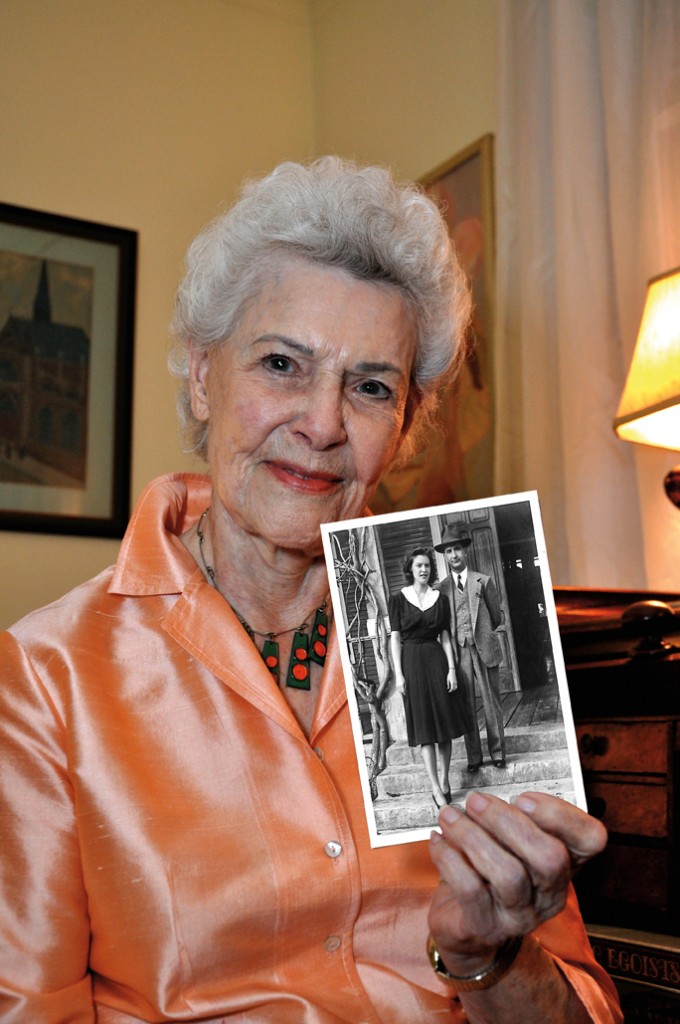
Henrietta MacGuire with a photo of herself and the future President of Costa Rica in exile in Mexico, late 1940s.
by Jennifer Kornegay; photos by Bob Corley
“You understand, of course, that I will not be limited by the truth,” said Henrietta MacGuire.
So began my coffee date/interview with a dear friend and arguably our city’s most interesting citizen. The statement is a classic example of MacGuire’s wit and the playful banter that encroaches on almost every conversation with her. Despite the above assertion, the events relayed here are accurate.
Perfectly coiffed hair, timeless fashion sense and a youthful sparkle that lights her eyes make it difficult to discern her age. In terms of relating to her, age becomes an irrelevant number. Yet her 93 years combined with an explorer’s soul have bequeathed upon her a vast array of remarkable experiences and made her a walking treasure trove of knowledge, wisdom and amazingly good stories, all of which she openly shares.
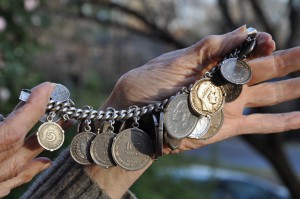
An expanding memento of world travels, her charm bracelet includes coins from France, Germany, Israel, Poland, Greece, Great Britain and the U.S.
Even her accessories open the door to some exotic tale; a lovely bangle bracelet on her wrist jingles and jangles with coins from more than 20 countries she’s visited. Point to one, and you’re off on an adventure.
So what’s this former First Lady of Costa Rica doing in the Capital City? A better question may be, “What ISN’T she doing?”
Born in Spartanburg, S.C., in 1918, MacGuire studied at Birmingham Southern College in the late ‘30s. After graduating she journeyed to Costa Rica to visit an aunt and uncle. World travel has always been a vital part of her life.
“When I was younger, my older brothers were off in the Holy Land and in parts of South America,” she said. “When they wrote home, I was always fascinated by the strange stamps on the envelopes. The idea that if you were able, you should travel, was very natural to me, so I just assumed that as soon as I finished school, I would go off somewhere.”
While in Costa Rica, on a visit with her aunt and uncle to a neighbor’s coffee-processing plant, MacGuire met Jose Figueres Ferrer. The meeting evolved into a date, then a relationship, and finally marriage in 1941. But their wedded bliss was interrupted.
After a radio speech in which he condemning corruption and communist influences in the sitting Costa Rican government, Ferrer was arrested and imprisoned, and the couple forced into exile in Mexico.
They returned to Costa Rica two years later, in 1948, with plans for a revolt, and the weapons to make it happen in-hand. Led by Ferrer, the revolution was successful. When it ended, he became Costa Rica’s president, and today is hailed as the Father of Democracy in Latin America.
It was not, however, a bloodless revolution, and MacGuire is understandably reluctant to discuss it. Its conclusion was a seminal moment in her life.
“The loss of life in such a small country was so painful,” she said. “The day the revolution ended and the killing stopped so we could begin to rebuild and reconstruct was a miraculous moment and almost magical. It restored us to hope and to look to the future.”
When she speaks of the revolution, the toll it took on her is obvious. Thoughts back to that grave time chase the smile from her face almost instantly. Yet, she is proud of what was accomplished.
“During this period, most of Latin America was ruled by dictators,” she said. “One of Ferrer’s beautiful dreams was to unite all of Latin America and South America into one democratic country. He was a true visionary.”
She stressed another, equally important and joyful moment in her life – becoming a mother.
“To create another human and bring forth a child is so profound,” she said. “It’s something she’s done twice. Her son is a successful businessman in Costa Rica, and her daughter is Costa Rica’s Ambassador to the U.S.
When her marriage to Ferrer ended in 1955, she moved to New York City and worked for the United Nations. She then left New York and moved to Paris. While there, she received a letter from a childhood friend.
“He was in Montgomery, and he said that the next time I was in America, I should look him up,” And she did.
In 1965 she moved to Montgomery and married Dr. Hugh MacGuire. Ever since, she has been leading little revolutions of her own in Montgomery, encouraging and supporting positive changes by tirelessly volunteering for non-profit organizations.
She lends her time and talents to the Montgomery Museum of Fine Arts, Booker T. Washington magnet school and the Council on Substance Abuse to name a few. In true MacGuire fashion, she refers to her good work as “rescuing humanity.” When she’s not saving the world, she can be found at the office of River Region Living magazine, formerly Montgomery Living, a publication she helped found in 1996.
A keen observer of her surroundings, MacGuire has seen great changes in Montgomery since she first came here, changes that make her proud to call it home.
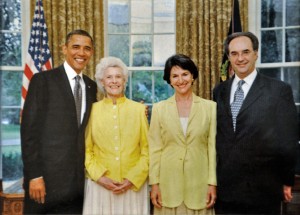
Pres. Obama welcomes MacGuire and her daughter Muni, the Costa Rican Ambassador to the U.S., and her husband, during the presentation of diplomatic credentials. (contributed)
“When I first came here, Montgomery was mired in the past,” she said. “But now the city is on the verge of exploding into an entirely different approach and the acceptance that we are living in a global society. Young people I meet are intent on traveling and learning about other cultures. I love seeing this beyond Montgomery, too, people excited about learning other languages and doing business with other countries.”
MacGuire makes it a point to meet and talk with young people regularly.
“They are so full of life and offer different perspectives on so many things,” she said. “It’s rejuvenating to be around them.”
While she appreciates the glories of youth, she’s never been one to complain about her age. Her attitude, in fact, is quite the opposite.
“If you are physically healthy, old age is a liberating time,” she said. “Your kids are grown; your career is done; you have the luxury of pursuing interests that don’t pay and don’t relate to anything in your life thus far.”
But how can one maintain the physical health that is an integral factor of the freedom she touts?
“There are three secrets to good health. One, inherit good genes. You should be very careful when choosing your parents,” she said. “Two, listen to the old adages: eat right, don’t smoke and exercise, exercise, exercise. Three, keep your mind sharp by keeping it stimulated. This will keep your mood up, and that certainly affects your physical wellbeing.”
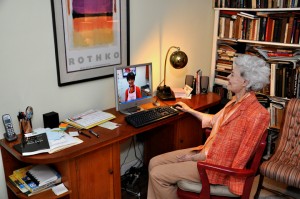
MacGuire does her writing at a desk once owned by Scottie Fitzgerald, daughter of F. Scott and Zelda Fitzgerald.
She suggests plunging into some interest or hobby to keep discovering and reaching out.
“That keeps you young,” she said. Following her own advice, MacGuire is learning to speak Italian.
Through everything she’s encountered and all she has seen, one important lesson stands out in her mind, a lesson that leads to harmony and one she hopes others will also take to heart.
“I am continually struck by how similar we all are fundamentally,” she said. “At our most basic level, we are all the same. I realize that this is truer and truer every day I live.”










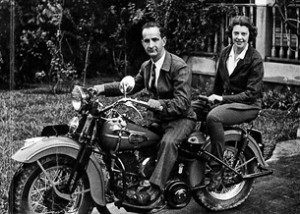

One Response to “First Lady of the Revolution”